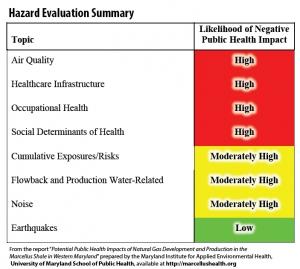

A School of Public Health report on the potential public health impacts if fracking is allowed in Maryland, released in August, has been the focus of a series of recent forums to discuss the implications of its findings and to inform state decision-makers.
Commissioned by the Maryland Department of Health and Mental Hygiene and the Maryland Department of the Environment, the report was produced by UMD public health and environmental justice experts, with input from residents of Maryland’s Garrett and Allegany counties, which hold the untapped natural gas reserves, and a variety of other stakeholders. It is the first report of its kind to be used in guiding state policy decisions about whether and how unconventional natural gas development (UNGD) should take place.
The researchers, employing a baseline assessment of the population health in Alleghany and Garrett counties and an impact assessment of residents’ potential exposures, found the areas of greatest concern to be threats to air quality, social determinants of health, occupational health, and the healthcare infrastructure.
“The report is designed to inform recommendations by the Marcellus Shale Safe Drilling Initiative’s Advisory Commission, which will in turn help the Governor to decide whether to permit fracking in the region,” explains Dr. Donald Milton, director of the Maryland Institute for Applied Environmental Health (MIAEH) and the project leader. “We provide possible adaptive and public health protection strategies that would be essential to enact if drilling is allowed within Maryland’s Marcellus Shale resource. The focus of our recommendations is protecting public health in Maryland.” The 200-page report covers eight categories of potential hazards and presents 52 specific recommendations.
On September 15, representatives from the study team gave a presentation on the report to the 15 members of the Advisory Commission, as well as answered questions from the Commission and about 50 members of the public. In their presentation, the study team explained how they grouped and then ranked risks, such as air emissions, in categories of “low, moderate, high, or insufficient data to determine risk.”
The Commission meeting discussion focused on questions of how or whether best practices recommended by the Maryland Department of the Environment would be sufficient to prevent potential adverse impacts on public health. Dr. Milton explained that in some areas “best practices” require active enforcement to make a significant difference. As an example, he noted that the National Institute for Occupational Safety and Health (NIOSH) recently found that toxic crystalline silica exposures to natural gas workers exceeded long established occupational standards by more than ten fold. Thus, although OSHA inspectors visit 1 in 50 to 1 in 100 US employers per year and the technology to control silica exposures has long existed, best practices and legal standards have not been sufficient to prevent hazardous silica exposure from fracking.
On September 12, a working symposium was held at the University of Maryland School of Nursing to assess the findings of the report. Co-hosted by the Maryland Environmental Health Network (MEHN), the Chesapeake Chapter of Physicians for Social Responsibility (CPSR), and the Alliance of Nurses for Healthy Environments, the Symposium was attended by forty people, who included public health officials and researchers, graduate students, clinicians, health advocates, and environmental regulators. After a presentation by the MIAEH study team, a panel of seven public health experts with background in fracking and health impact assessments discussed the study. Symposium participants collectively agreed that the UMD SPH study is valuable, that the state of the existing science on the health effects from fracking is still inadequate to determine whether it can be done safely, and that emerging evidence suggests that health issues associated with gas and oil well development need to be better understood. As a consequence, the MEHN and CPSR concluded that Maryland should not proceed with hydrofracturing at this time.
Public comments on the report Potential Public Health Impacts Of Natural Gas Development And Production In The Marcellus Shale In Western Maryland are due by COB Friday, October 3.
At the Third Annual Symposium on Environmental Justice and Environmental Health Disparities in Maryland and Washington, DC, held December 6-7 at the University of Maryland, a panel session will be held on "Fracking in Maryland, West Virginia, and Pennsylvania: Risks, Impacts, and Disparities," and include discussion of this report.
Full report: http://www.marcellushealth.org/final-report.html
Submit comments on the report by Oct. 3 to dhmh.envhealth@maryland.gov
Media Coverage:
Washington Post: Fracking Could Threaten Air Quality, Workers’ Health, Latest Report Says
NPR's StateImpact: Maryland Takes a Public Health Approach on Fracking That PA Hasn’t Tried
WYPR: Report: Fracking Would Likely Harm Public Health in Maryland